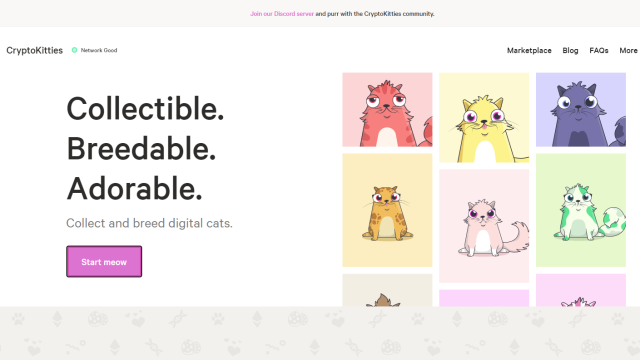Axiom Zen’s CryptoKitties, which is essentially a digital version of Beanie Babies based on the Ethereum blockchain, sucked in a massive amount of funding just a few months ago. But it looks an awful lot like people bought into CryptoKitties looking for a quick return on their investment and are finding that digital cats don’t always go up in or even hold their price.
Screenshot: CryptoKitties.co
Per a Saturday report in Business Insider, investors put an additional $US12 ($16) million into CryptoKitties in March after users had already pumped millions of dollars into the network buying and trading the cats.
Unlike cryptocurriences where each token generally does not differ in value and is indistinguishable from each other (unless perhaps they are traceable), CryptoKitties are what’s called a non-fungible token (NFT): Each one is unique.
Just like a rare Beanie Baby, each CryptoKitty in theory holds a different value and has to be traded for with something like other cryptocurrencies.
At the time of the $US12 ($16) million investment, Business Insider wrote, one investor told the site the project “embodied one of the most important and applicable use-cases of the blockchain: The ability to safely store digital collectables online.”
To the extent that everyone’s CryptoKitties are safely stored, that’s true. But that’s an entirely different question than whether they have continued to hold value. As Business Insider noted, a massive decrease in market activity shows that the CryptoKitties network appears to be losing steam rapidly, at the same time the price of the collectables is dropping:
According to data from blockchain analytics sites Bloxy and Diar, the number of CryptoKitties transactions has fallen drastically in the last 3 months.
The number of CryptoKitties transactions decreased in June by 98.4 per cent compared to its peak of 80,500 transactions back in December 2017, according to data from Bloxy. The game is still among the most popular options for ethereum-related gaming, but public interest in buying and selling them seems to have waned significantly in recent months.
… In April, Greylock Partners took a closer look at the usage of some of the most popular decentralized apps. Drawing on data from DappRadar, the firm estimated CryptoKitties daily active users at around 907. On Friday, that same metric on DappRadar had fallen to around 300 daily active users.
The Diar analytics show that the “median price of sold kitties peaked at $US41 ($55) and now is constantly at about $US5 ($7),” with daily trading volume down to around $US21,000 (#28,210) from $US2.3 ($3) million in December 2017.
Cryptokitties usage down 98.5% since its peak. Less than 200 DAU. pic.twitter.com/s7PpyBz5bo
— nic carter (@nic__carter) June 8, 2018
“Rare Bits lists roughly 700,000 CryptoKitties for sale while only 4200 have been sold in the last week,” the Diar analysis added. According to them, it’s a clear case of a speculative bubble gone awry in the NFT gaming sector writ large:
One of the bottlenecks is that the games only allow the most basic functionality such as breeding and battling, which leads to speculation and not much else. When the users eventually find out that there is more demand to sell than to buy, the popularity starts to fade away as easy profits are no longer made.
For what it’s worth, the company says that lower trading volume does not necessarily mean that the cats themselves are becoming worthless. In an email, cofounder Bryce Bladon told Business Insider that one of the factors prohibiting people from investing further was the ballooning cost of transactions, since it’s based on the Etherum blockchain and subject to the network’s restrictions.
Etherum gas fees, which are essentially transaction costs, “have also increased by 50x what they were when we launched,” Bladon wrote. “The result is much more purposeful transactions, as opposed to people engaging with the smart contract just to see what happens.”
Bladon added that they are trying to build new functionality into CryptoKitties, adding “KittyBattles” and “KittyHats” — the first being sort of a cuter version of Pokémon and the latter being electronic accessories for the kitties themselves.
Yet as noted by CCN, Pokémon GO launched to a peak of 45 million users before quickly dropping down to around five million, where seems to have plateaued. While the KittyHats might be cool, it is perhaps a strategy that works better for sustaining the interest of an already broad userbase (a la Team Fortress 2) rather than building one.
Beanie Babies themselves surged in the 1990s; according to the New York Post, the brand’s strategy of discontinuing older lines of products to generate a speculative frenzy generated countless millions in profits before the mania faded and prices crashed by around the year 2000.
But at the end of the day, anyone holding a Beanie Baby still had their little plushie; people spending six-figure sums on CryptoKitties could end up having the equivalent of a digital trading card to which they only own some of the rights.
According to the Diar analysis, the problem is that NFT-based games can only have “sustainable value” is if they can offer a fun enough experience for users to keep the activity going, which is frustrated by the current state of the Ethereum network:
With the current problems of blockchain scalability, action heavy game that involves NFTs would prove to be expensive for the users and also inconvenient because of the relatively long confirmation times for transactions.
It’s unlikely that a permissionless blockchain such as Ethereum would be able to handle the traffic of widespread adoption if it couldn’t even handle less than two thousand active users at its peak.
But hey, at least they’re cute.
